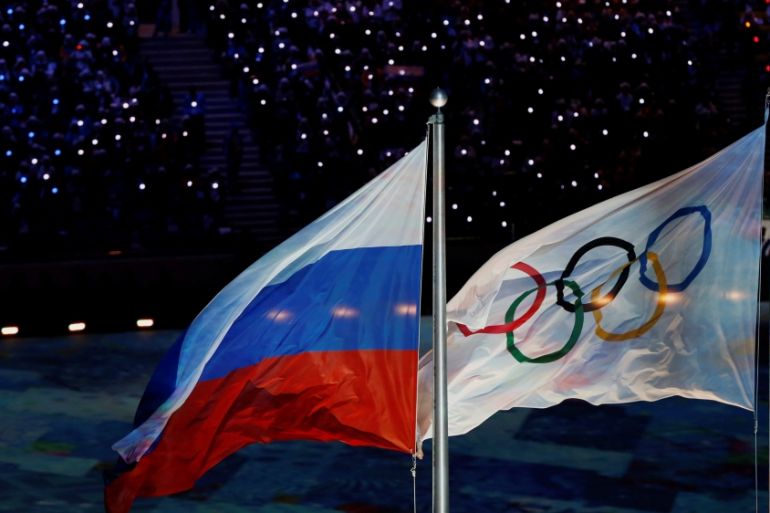WADA: Over 1,000 Russian athletes involved in doping
World Anti-Doping Agency says “unprecedented cover-up” allowed for “institutionalised” doping among top-level athletes.

More than 1,000 Russian athletes competing in summer, winter and paralympic sport were involved in or benefited from an institutional conspiracy to conceal positive doping tests, a report by the World Anti-Doping Agency (WADA) said.
The report, compiled by Canadian sports lawyer Richard McLaren, provided more details of an elaborate state-sponsored doping scheme operated by Russia.
Keep reading
list of 4 itemsKiptum remembered in Kenya’s London marathon double
OJ Simpson dies after battle with cancer
British runner completes challenge to run length of Africa
It said there was a systematic cover-up, which was refined at the 2012 Olympics, 2013 world athletics championships and 2014 Sochi Winter Olympics, and that more than 30 sports, including football, were involved in concealing positive doping samples.
|
|
“We are now able to confirm a cover-up that dates back until at least 2011 and continued after the Sochi Olympics,” McLaren told a news conference on Friday.
“It was a cover-up on an unprecedented scale and the second part of this report shows the evidence that increases the number of athletes involved as well as the scope of the conspiracy and cover-up.
“We have evidence revealing that more than 500 positive results were reported as negative, including well-known and elite-level athletes, who had their positive results automatically falsified.”
McLaren said Russia won 24 gold, 26 silver and 32 bronze medals at London 2012 and no Russian athlete tested positive.
“Yet the Russian team corrupted the London Games on an unprecedented scale, the extent of which will probably never be fully established,” he said.
“The desire to win medals superseded their collective moral and ethical compass and Olympic values of fair play.
“For years international sports competitions have unknowingly been hijacked by the Russians. Coaches and athletes have been playing on an uneven field. Sports fans and spectators have been deceived and it is time this stops.”
Al Jazeera’s Lee Wellings, reporting from the McLaren press conference, said this report was probably not the end of the revelations.
“It’s such a mess, sport finds itself in a very difficult position,” he said.
“But this is not the end. There’s always fear more reports and revelations will come out. Russia felt it needed to be back at the pinnacle of sport and they opted to use a different method to achieve that.”
Meanwhile, Russian officials have said there is no concrete evidence of institutionalised, state-sponsored doping, according to Al Jazeera’s Natasha Ghoneim, who was reporting from Moscow.
She added that investigators conducted raids throughout the country and interviewed at least 60 athletes.
|
|
Whistleblower Yulia Stepanova, who exposed Russia’s state-backed and systematic doping programme, has denied being a traitor and said being banned for two years was the turning-point.
Stepanova secretly recorded Russian coaches and athletes describing how they used performance-enhancing drugs.
“Every night I had a dream that the doping inspectors were coming to test us, every single night the same nightmare. I was really afraid of being tested because I didn’t know how the system worked,” she told the BBC.
“I didn’t realise that the management was in on it, that even if you’re caught you won’t be disqualified if your coach has connections.”
Stepanova, who was given a two-year ban in 2013 for abnormalities in her blood passport, said that suspension made her determined to expose how deep the problems in Russian athletics had actually spread.
‘I told the truth’
“I don’t consider myself a traitor. I simply revealed the shameful truth, which our country doesn’t want to confront, and the only reason I told the truth about it all was to try and put a stop to it.”
The report added that four Sochi gold medallists had samples with physiologically impossible salt readings, while 12 Russian Sochi medallists had evidence of tampering with the bottles containing their urine samples.
The original McLaren report, released in July, was one of two commissioned by WADA which revealed widespread state-sponsored doping in Russian sport.
The July report found Moscow had concealed hundreds of positive doping tests in many sports ahead of the Sochi Games and led to a partial ban of Russian athletes competing in the Rio de Janeiro Olympics in August.
Although Russian track and field athletes and weightlifters were banned from competing at Rio, the International Olympic Committee rejected a blanket ban and let international sports federations decide which athletes should be eligible to compete.
|
|